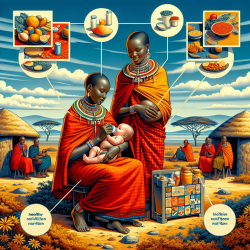Introduction
In the realm of infant nutrition, cultural practices and beliefs significantly influence maternal decisions. The research article "Maternal perceptions of breastfeeding and infant nutrition among a select group of Maasai women" provides a profound insight into the breastfeeding practices among Maasai women in Tanzania. This blog post aims to help practitioners improve their skills by implementing the outcomes of this research or encouraging them to delve deeper into this field.
Understanding the Maasai Context
The Maasai community in the Ngorongoro Conservation Area of Tanzania faces unique challenges, including high poverty rates and food insecurity. These factors, coupled with cultural beliefs, impact maternal and infant nutrition practices. The research highlights that while breastfeeding is a universal practice among Maasai mothers, exclusive breastfeeding (EBF) is not widely practiced due to perceived insufficiency of maternal milk and poor maternal nutrition.
Key Findings and Recommendations
- Breastfeeding Initiation and Duration: Most Maasai mothers initiate breastfeeding within an hour of birth, aligning with WHO recommendations. However, the practice of EBF is limited, with infants receiving supplemental liquids early on.
- Intergenerational Knowledge Transfer: Breastfeeding knowledge is primarily passed down from elder women, emphasizing the importance of culturally sensitive health education that respects traditional practices.
- Maternal Nutrition: The study underscores the need for improved maternal diets to support EBF. Practitioners should advocate for nutritional support programs and food security initiatives to address these challenges.
Implementing Research Outcomes
For practitioners working in similar contexts, the following strategies can be adopted:
- Culturally Sensitive Education: Develop educational programs that incorporate traditional knowledge and practices, ensuring they resonate with local beliefs.
- Community Engagement: Involve community leaders and elder women in health promotion efforts to enhance acceptance and adherence to recommended practices.
- Nutritional Support: Advocate for programs that provide nutritional supplements to lactating mothers, addressing the root causes of food insecurity.
Encouraging Further Research
This study opens avenues for further research in several areas:
- Exploring the perceptions of elder women regarding infant nutrition practices.
- Comparing breastfeeding practices among different Maasai communities.
- Assessing the impact of delivery location on breastfeeding practices.
By understanding and addressing the cultural and socioeconomic factors influencing infant nutrition, practitioners can develop more effective health promotion strategies that improve maternal and child health outcomes.
To read the original research paper, please follow this link: Maternal perceptions of breastfeeding and infant nutrition among a select group of Maasai women.










